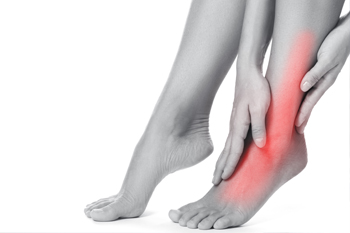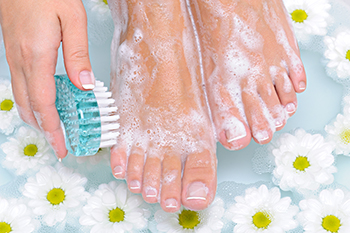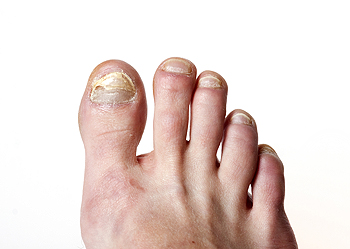

Dystonia is a neurological disorder causing involuntary muscle contractions and repetitive movements. When it affects the feet, it can lead to abnormal postures, twisting, and repetitive movements that affect mobility and balance. Foot dystonia can manifest as toe curling, arch cramping, or uncontrollable foot movements. These symptoms can cause discomfort, pain, and difficulty walking or standing. Additionally, foot dystonia may result in deformities, such as claw toes or high arches, over time. Treatment typically involves a combination of therapies, including medications, injections, and sometimes surgical interventions. If you or your child has unusual symptoms to do with movement of the feet, it is strongly suggested that you schedule an appointment with a podiatrist for an evaluation and diagnosis. Regular monitoring and adjustments to treatment plans may be necessary to address changes in symptoms and optimize outcomes.
Some foot conditions may require additional professional care. If you have any concerns, contact Dr. Harris L. Klear of Burlington County Podiatry Associates. Our doctor can provide the care you need to keep you pain-free and on your feet.
Rare Foot Conditions
The majority of foot conditions are common and can be treated by a podiatrist. Standard diagnostic procedures are generally used to identify specific conditions and treatment can be rendered. A podiatrist also treats rare foot conditions which can be difficult to diagnose and may need extra attention and care.
There are many rare foot conditions that can affect children. Some of these can include:
Freiberg’s disease - This can be seen as a deterioration and flattening of a metatarsal bone that exists in the ball of the foot. It typically affects pre-teen and teenage girls, but can affect anyone at any age. Symptoms that can accompany this can be swelling, stiffness, and the patient may limp.
Kohler’s disease - This often targets the bone in the arch of the foot and affects younger boys. It can lead to an interruption of the blood supply which ultimately can lead to bone deterioration. The patient may limp or experience tenderness, swelling, and redness.
Maffucci syndrome - This affects the long bones in a child’s foot leading to the development of abnormal bone lesions. They are benign growths and typically develop in early childhood and the bones may be susceptible to breaking.
A podiatrist can properly diagnose and treat all types of rare foot conditions. If your child is affected by any of these symptoms or conditions, please don’t hesitate to call our office so the correct treatment method can begin.
If you have any questions please feel free to contact one of our offices located in Marlton and Delran, NJ . We offer the newest diagnostic tools and technology to treat your foot and ankle needs.
 Recognizing the early signs of an ingrown toenail can help you to avoid more serious complications by getting quicker treatment. One of the first signs is tenderness or pain along the edge of the toenail. You may feel it most when you walk or apply pressure to the area. As the condition progresses, redness and swelling may develop around the affected toenail, indicating inflammation and potential infection. The skin along the edge of the nail may become irritated or appear puffy. If there is pus or discharge appearing at the edge of the nail, the ingrown toenail has likely become infected. If you have an ingrown toenail, or struggle with recurrent ingrown toenails, it is suggested you consult a podiatrist who can effectively treat the condition and prevent complications from arising.
Recognizing the early signs of an ingrown toenail can help you to avoid more serious complications by getting quicker treatment. One of the first signs is tenderness or pain along the edge of the toenail. You may feel it most when you walk or apply pressure to the area. As the condition progresses, redness and swelling may develop around the affected toenail, indicating inflammation and potential infection. The skin along the edge of the nail may become irritated or appear puffy. If there is pus or discharge appearing at the edge of the nail, the ingrown toenail has likely become infected. If you have an ingrown toenail, or struggle with recurrent ingrown toenails, it is suggested you consult a podiatrist who can effectively treat the condition and prevent complications from arising.
Ingrown toenails may initially present themselves as a minor discomfort, but they may progress into an infection in the skin without proper treatment. For more information about ingrown toenails, contact Dr. Harris L. Klear of Burlington County Podiatry Associates. Our doctor can provide the care you need to keep you pain-free and on your feet.
Ingrown Toenails
Ingrown toenails are caused when the corner or side of a toenail grows into the soft flesh surrounding it. They often result in redness, swelling, pain, and in some cases, infection. This condition typically affects the big toe and may recur if it is not treated properly.
Causes
You are more likely to develop an ingrown toenail if you are obese, have diabetes, arthritis, or have any fungal infection in your nails. Additionally, people who have foot or toe deformities are at a higher risk of developing an ingrown toenail.
Symptoms
Some symptoms of ingrown toenails are redness, swelling, and pain. In rare cases, there may be a yellowish drainage coming from the nail.
Treatment
Ignoring an ingrown toenail can have serious complications. Infections of the nail border can progress to a deeper soft-tissue infection, which can then turn into a bone infection. You should always speak with your podiatrist if you suspect you have an ingrown toenail, especially if you have diabetes or poor circulation.
If you have any questions, please feel free to contact one of our offices located in Marlton and Delran, NJ . We offer the newest diagnostic and treatment technologies for all your foot care needs.

Your feet carry you through life's journey, so it's essential to give them the care they deserve. From fungal infections to ingrown toenails, foot problems can be painful and inconvenient. However, with proper care and attention, you can keep your feet happy and healthy. Start by maintaining good hygiene, washing your feet twice daily, and drying them thoroughly, especially between the toes to prevent fungal infections like athlete's foot. Keep your skin moisturized, but avoid applying lotion between the toes to prevent fungal growth. Regularly remove hard skin from your heels and use a heel balm containing urea to prevent cracking. Choose breathable, well-fitting shoes made of leather to reduce perspiration and avoid synthetic materials. Trim your toenails straight across to prevent ingrown toenails, and avoid cutting them too short. Maintain clean environments by regularly bleaching your shower area and wearing sandals in public showers. If you experience persistent foot pain or notice any concerning symptoms in the feet, toes, and ankles, it is suggested that you make an appointment with a podiatrist who is medically trained to deal with these problems.
Everyday foot care is very important to prevent infection and other foot ailments. If you need your feet checked, contact Dr. Harris L. Klear from Burlington County Podiatry Associates. Our doctor can provide the care you need to keep you pain-free and on your feet.
Everyday Foot Care
Often, people take care of their bodies, face and hair more so than they do for their feet. But the feet are a very important aspect of our bodies, and one that we should pay more attention to. Without our feet, we would not be able to perform most daily tasks.
It is best to check your feet regularly to make sure there are no new bruises or cuts that you may not have noticed before. For dry feet, moisturizer can easily be a remedy and can be applied as often as necessary to the affected areas. Wearing shoes that fit well can also help you maintain good foot health, as well as making it easier to walk and do daily activities without the stress or pain of ill-fitting shoes, high heels, or even flip flops. Wearing clean socks with closed shoes is important to ensure that sweat and bacteria do not accumulate within the shoe. Clean socks help to prevent Athlete’s foot, fungi problems, bad odors, and can absorb sweat.
If you have any questions please feel free to contact one of our offices located in Marlton and Delran, NJ . We offer the newest diagnostic and treatment technologies for all your foot and ankle needs.

Toenail fungus, clinically known as onychomycosis, is a common condition that affects a significant portion of the population. This fungal infection typically occurs when microscopic fungi invade the toenails, leading to discoloration, thickening, and crumbling. The warm and moist environment inside shoes provides an ideal breeding ground for these fungi, making toenails susceptible to infection. Symptoms include changes in nail texture and color, ranging from yellowing to darkening. As the infection progresses, nails may become brittle and emit a foul odor. Toenail fungus is more prevalent than one may think, with a considerable percentage of the population grappling with this condition. Recognizing the symptoms early on is essential for effective management, as untreated toenail fungus can lead to persistent discomfort and potential complications. If you have a toenail fungus infection, it is suggested that you visit a podiatrist who can confirm the diagnosis and offer correct treatment methods, which often includes prescribed medication.
If left untreated, toenail fungus may spread to other toenails, skin, or even fingernails. If you suspect you have toenail fungus it is important to seek treatment right away. For more information about treatment, contact Dr. Harris L. Klear of Burlington County Podiatry Associates. Our doctor can provide the care you need to keep you pain-free and on your feet.
Symptoms
Treatment
If self-care strategies and over-the-counter medications does not help your fungus, your podiatrist may give you a prescription drug instead. Even if you find relief from your toenail fungus symptoms, you may experience a repeat infection in the future.
Prevention
In order to prevent getting toenail fungus in the future, you should always make sure to wash your feet with soap and water. After washing, it is important to dry your feet thoroughly especially in between the toes. When trimming your toenails, be sure to trim straight across instead of in a rounded shape. It is crucial not to cover up discolored nails with nail polish because that will prevent your nail from being able to “breathe”.
In some cases, surgical procedure may be needed to remove the toenail fungus. Consult with your podiatrist about the best treatment options for your case of toenail fungus.
If you have any questions, please feel free to contact one of our offices located in Marlton and Delran, NJ . We offer the newest diagnostic and treatment technologies for all your foot care needs.